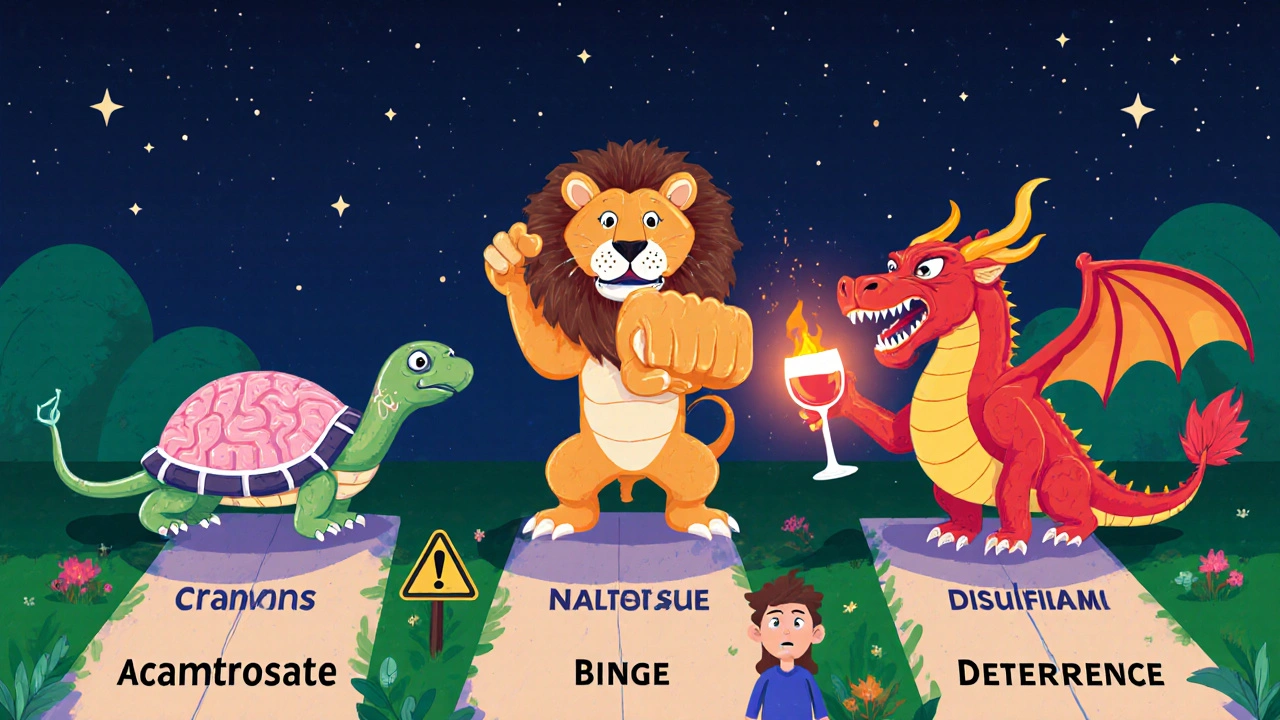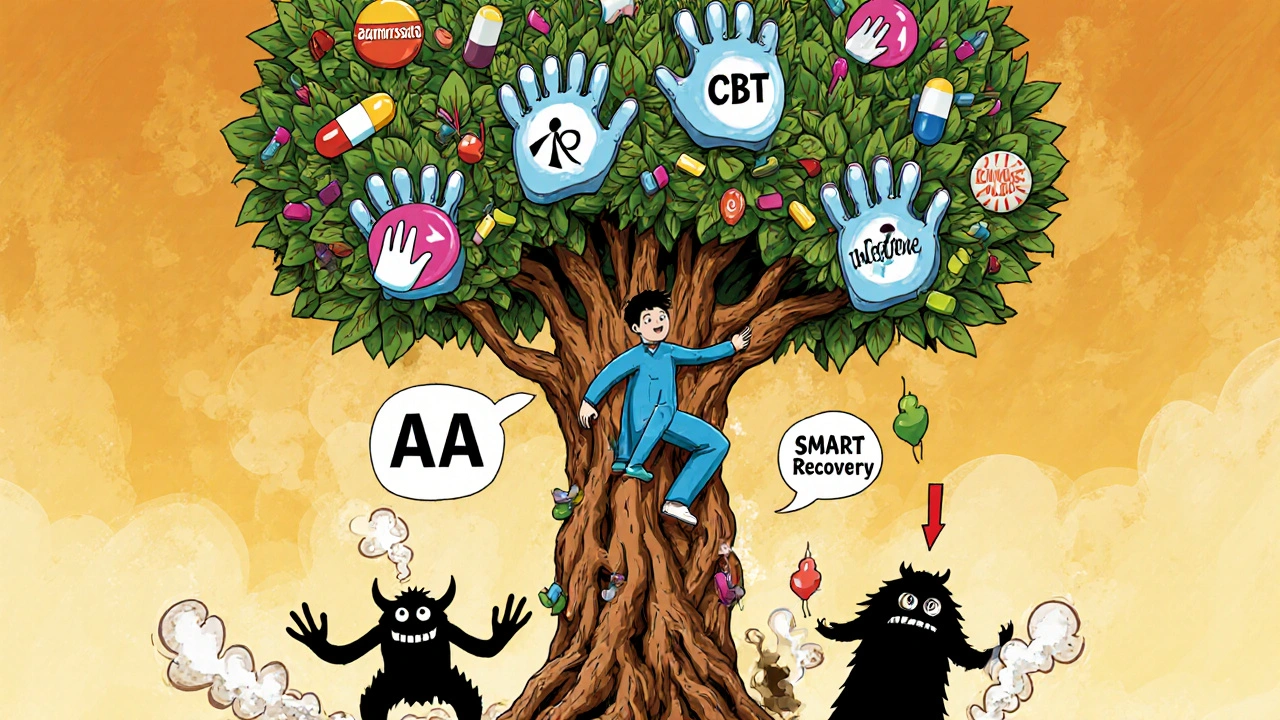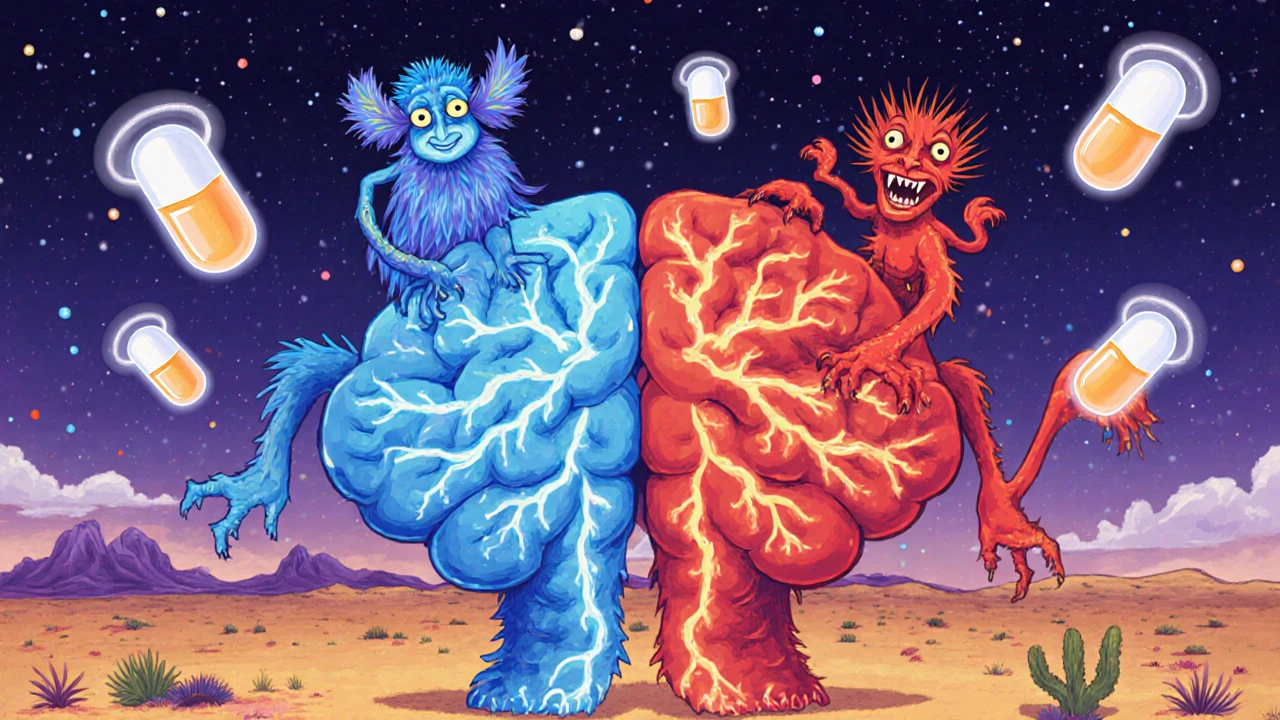Stopping alcohol use is one of the hardest things a person can do. It’s not just about willpower-it’s biology. Your brain has rewired itself around alcohol, and suddenly removing it can trigger intense cravings, anxiety, and even seizures. That’s where medications like Acamprol (brand name for acamprosate) come in. But is it the best option? And what are the alternatives that actually work?
What is Acamprol (Acamprosate)?
Acamprol is the brand name for acamprosate calcium. It’s not a cure for alcohol dependence, but it helps people who’ve already stopped drinking stay stopped. Unlike some other medications, it doesn’t make you sick if you drink. It doesn’t block alcohol’s effects. Instead, it works quietly in the background to restore balance in your brain chemistry.
Alcohol changes how your brain handles two key chemicals: glutamate (excitatory) and GABA (calming). When you quit, glutamate spikes, causing restlessness and cravings. Acamprosate helps normalize this imbalance. It’s taken three times a day, usually with food. Most people start seeing benefits within a week or two, but it takes consistent use to make a difference.
The European Medicines Agency and the U.S. FDA both approve it for maintaining abstinence in people who’ve already detoxed. It’s not for detoxing. It’s not for people still drinking. You need to be sober before starting.
How Acamprol Compares to Naltrexone
Naltrexone is the most common alternative to acamprosate. It’s available as a daily pill (Revia) or a monthly injection (Vivitrol). Where acamprosate targets brain chemistry to reduce cravings, naltrexone blocks the pleasurable effects of alcohol. If you drink while on naltrexone, you won’t get the usual high. That can make drinking feel pointless.
Studies show both drugs are similarly effective at helping people stay abstinent over six to twelve months. But they work for different types of people.
- If your main problem is cravings-thinking about alcohol constantly, feeling restless without it-acamprosate may work better.
- If you struggle with relapse triggered by drinking-like having one drink and then going on a binge-naltrexone might help more because it takes the reward out of it.
Naltrexone can cause nausea, dizziness, or headaches. It also requires liver function tests before starting. Acamprosate is gentler on the liver, but it can cause diarrhea or anxiety in some people. Neither drug is addictive.
Disulfiram: The Old-School Option
Disulfiram (Antabuse) has been around since the 1940s. It’s the medication that makes you sick if you drink. It blocks the breakdown of alcohol in your body, causing a buildup of acetaldehyde. Symptoms include flushing, vomiting, rapid heartbeat, and low blood pressure. It’s designed to be a deterrent.
It’s not used as often today because it’s risky. Even a small amount of alcohol-like in mouthwash or cough syrup-can trigger a reaction. Some people stop taking it because they can’t handle the fear of accidental exposure. Others find it effective because the threat is strong enough to keep them sober.
Acamprosate is safer and easier to use long-term. Disulfiram requires constant vigilance. It’s not ideal for people with unstable living situations, memory problems, or those who might forget to take it. But for someone highly motivated and with strong support, it can work.

Topiramate: An Off-Label Contender
Topiramate (Topamax) is an antiseizure drug approved for epilepsy and migraines. But in clinical trials, it’s shown strong results for reducing alcohol consumption and increasing abstinence rates.
It works by reducing glutamate activity and boosting GABA-similar to acamprosate, but more broadly. People on topiramate often report fewer cravings and less drinking. Some studies suggest it may be more effective than acamprosate for heavy drinkers.
The catch? Side effects. Topiramate can cause tingling in hands and feet, memory issues, trouble concentrating, and kidney stones. Weight loss is common-sometimes a benefit, sometimes a concern. It’s not FDA-approved for alcohol use disorder, but doctors prescribe it off-label, especially in the UK and Australia.
If you’ve tried acamprosate and it didn’t help, topiramate is worth discussing with your doctor. It’s not for everyone, but for some, it’s the missing piece.
Bupropion and Other Emerging Options
Bupropion (Wellbutrin), an antidepressant, has been studied for alcohol dependence, especially in people with depression or smoking issues. It doesn’t directly target alcohol pathways, but it helps with mood and impulse control. Results are mixed-some studies show benefit, others don’t.
Varenicline (Chantix), originally for smoking cessation, has shown promise in small trials for reducing alcohol cravings. It acts on the same brain receptors as nicotine, which overlap with alcohol reward pathways. It’s not approved for alcohol use disorder, but research is ongoing.
These aren’t first-line options. But if you’ve tried the standard trio-acamprosate, naltrexone, disulfiram-and nothing stuck, these could be next steps. Always work with a specialist who understands addiction medicine.
Which One Should You Choose?
There’s no single best drug. The right choice depends on your history, your triggers, your health, and your goals.
| Medication | How It Works | Best For | Common Side Effects | Requires Sobriety? |
|---|---|---|---|---|
| Acamprol (Acamprosate) | Stabilizes brain chemicals (glutamate/GABA) | People with strong cravings after quitting | Diarrhea, anxiety, dizziness | Yes |
| Naltrexone | Blocks alcohol’s pleasurable effects | People who binge after one drink | Nausea, headache, fatigue | Yes |
| Disulfiram | Causes sickness if alcohol is consumed | Highly motivated, stable environment | Flushing, vomiting, low BP | Yes |
| Topiramate | Reduces glutamate, boosts GABA | Heavy drinkers, failed other treatments | Tingling, memory issues, kidney stones | Yes |
| Bupropion | Improves mood and impulse control | Co-occurring depression or smoking | Insomnia, dry mouth, seizures (rare) | Yes |
If you’re just starting out, acamprosate is often the first choice because it’s well-tolerated and doesn’t carry the risk of severe reactions. If you’ve tried it and it didn’t help, naltrexone is the next logical step. Disulfiram is reserved for those who need a strong external deterrent. Topiramate is a powerful option for those who haven’t responded to the others.

Medication Alone Isn’t Enough
No pill replaces therapy, support groups, or lifestyle change. Medications work best when paired with counseling-like cognitive behavioral therapy (CBT) or motivational interviewing. These help you understand why you drink, what triggers you, and how to cope without alcohol.
In the UK, the NHS offers free support through Alcoholics Anonymous, SMART Recovery, and local addiction services. Combining medication with these programs doubles your chances of long-term success.
Many people think they need to hit rock bottom before getting help. That’s not true. The sooner you start treatment, the better your outcome. Acamprosate and its alternatives aren’t magic. But they give you a real shot at staying sober when willpower alone has failed.
What If Nothing Works?
It’s not uncommon to try one or two medications and still struggle. That doesn’t mean you’re broken. It means you need a different approach.
Some people benefit from combining medications-like naltrexone and acamprosate together. Research shows this combo can be more effective than either alone, though it’s not standard practice everywhere.
Other options include newer drugs in clinical trials, like gabapentin or baclofen. These aren’t widely available yet, but they’re being studied for people with severe dependence or co-occurring anxiety.
The key is persistence. Work with a specialist who understands addiction. Don’t give up after one failed attempt. Treatment is personal. What works for someone else might not work for you-and that’s okay.
Can I drink while taking Acamprol?
You shouldn’t drink while taking Acamprol. It doesn’t cause a dangerous reaction like disulfiram does, but drinking defeats the purpose. Acamprol helps you stay abstinent. If you’re still drinking, it won’t work. It’s only effective after you’ve stopped.
How long do I need to take Acamprol?
Most people take it for at least six months. Some stay on it for a year or longer. The longer you take it, the more your brain relearns how to function without alcohol. Stopping too early increases relapse risk. Always follow your doctor’s advice on duration.
Is Acamprol addictive?
No. Acamprosate has no potential for abuse or dependence. It doesn’t cause euphoria, sedation, or withdrawal symptoms. You can stop it safely at any time without tapering.
Can I take Acamprol if I have kidney problems?
Acamprosate is cleared by the kidneys. If you have moderate to severe kidney disease, your doctor may reduce your dose or avoid it entirely. Always tell your doctor about any kidney issues before starting.
Which is better: Acamprol or naltrexone?
It depends on your situation. Acamprol reduces cravings after quitting. Naltrexone reduces the urge to drink by blocking pleasure. If you’re struggling with constant thoughts about alcohol, acamprol may be better. If you tend to binge after one drink, naltrexone might help more. Some people use both.
Can I switch from Acamprol to another medication?
Yes. If Acamprol isn’t working after 3-6 months, talk to your doctor. You can switch to naltrexone, topiramate, or another option. There’s no harm in trying different medications until you find one that fits.
Next Steps
If you’re considering treatment for alcohol dependence, start by talking to your GP or an addiction specialist. Don’t wait for a crisis. Bring up your concerns openly-medications like Acamprol are safe, effective, and widely available on the NHS.
Keep a journal of your drinking patterns, triggers, and cravings. That helps your doctor choose the right medication. And don’t underestimate the power of peer support. Recovery isn’t a solo journey. You don’t have to do it alone.

